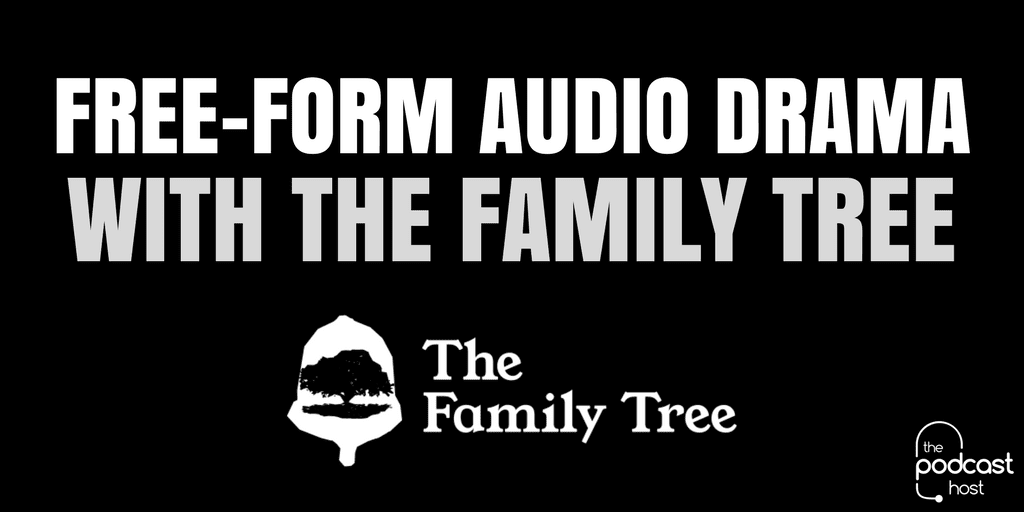Free-Form Audio Drama with The Family Tree | Podcaster Showcase

In our Podcaster Showcase series, we interview a podcaster who’s finding success with their show. We delve into how they started, how they’ve grown an audience and what they do to get a return on their efforts. The aim is to share experience and learn from anyone that’s making it work!
This week, we’re talking to J Adamthwaite and Dave Pickering from The Family Tree.
Give us a written trailer for your show. Why should we listen?
The Family Tree is a magical realist drama about family, belonging, change and identity.
When podcast producer Dave Pickering is approached by his dad with a mystery from the life of a long-forgotten friend, he decides to investigate it in the only way he knows how: by having conversations.
Mark Sullivan, who went missing 15 years ago, has been found dead. His body still has the arm he should have lost in a car accident and seems to have died eight years before he disappeared.
In a series of 12 episodes, Dave tries to uncover this mystery through conversations with Mark’s family and friends. As he gets to know them, his questions lead to more questions… the mystery runs deeper than anyone imagined. The drama is accompanied by 12 non-fiction companion pieces, in which real-life guests discuss themes and issues raised in the show.
We are currently producing Season 2, in which the world broadens and Dave finds himself chronicling things he hadn’t even thought were possible.
Why did you decide to start the podcast?
We had a story we wanted to tell, and we didn’t see any drama podcasts that used the format we were interested in working in, which was free-form conversation.
What equipment do you use to record?
We record using a number of a different kinds of equipment to simulate different recording environments. These include a Zoom H2N recorder, a Marantz PMD661 with a dynamic microphone, a Dictaphone, Skype recordings, a USB audio interface (like the Focusrite Scarlett 2i2) with dynamic microphones and in Season 2, we will be using a binaural microphone. The plot dictates which recording device is used.
What’s your recording environment/setup usually like?
Most scenes in The Family Tree take place in the homes of the characters. We create these spaces by setting up the microphone in informal places, such as on a kitchen table or a coffee table in a living room. We actively encourage homely background sounds because we feel it adds to the realness of the show. For example, in one episode, we’ve had our characters pottering around the kitchen cooking, and have included the sounds of bubbling pots and boiling kettles in the recording.
What is your usual editing process?
We use Adobe Audition and Audacity, taking individual passes over an episode before coming together to discuss structuring notes and doing a final edit. Editing may involve moving pieces of conversation around to strengthen the plot, or cutting elements that may contradict a previous or later episode. We do edit out some audio messiness, but we are careful to leave a lot in to add to the naturalness of the soundscape.
What are the top 3 ways you’ve gained new audience members?
We have gained new audience members by guesting on other podcasts, being reviewed in podcast review articles and through the guests we have on the non-fiction element of the show.
How do you get a return from your show, whether monetary or otherwise?
For us, the best return is hearing stories about how people have engaged with the show. We love it when we hear that audiences care about the characters, become invested in a particular aspect of the story, or change the way they think about something. We also have a Patreon campaign, which helps us to fund the show.
What unexpected benefit have you gotten from your show?
The story now lives with us in a very real way. We often find ourselves saying things like, ‘that’s what Nathan would say,’ or ‘imagine how Reverend Beech would feel about that!’ and we often relate real-world events to things that have happened within the show. Just as we hope to comment on the world with our story, we find our own analytical thinking enhanced by living with the Sullivan family story.
What 1 piece of advice do you have for a new podcaster in your industry?
Play. Sometimes not knowing the ‘rules’ means you have less of a box to work within, which can lead you into interesting creative territory. Podcasting doesn’t have to be about producing radio-quality audio: that’s what radio is for. Podcasting is about making what you want to make in the way that best serves the project.
About J and Dave
Dave Pickering is a Sony Award-nominated and British Podcast Award winning audio producer and writer, whose work can be found at www.davepickeringstoryteller.co.uk. J Adamthwaite is a fiction writer with a particular interest in magical realism.
You can follow them here: @familytreepod
